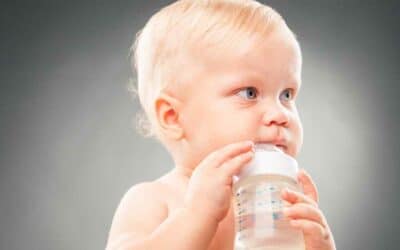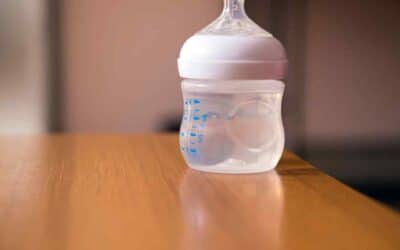You can’t go wrong when you’re talking to your baby.
But when it comes to giving your little one their first sips of water, you might wonder: How can I make sure this goes smoothly?
That’s where Baby’s First Sips comes in! We’ll walk you through everything you need to know about when and how to safely give your baby their first sip of water.
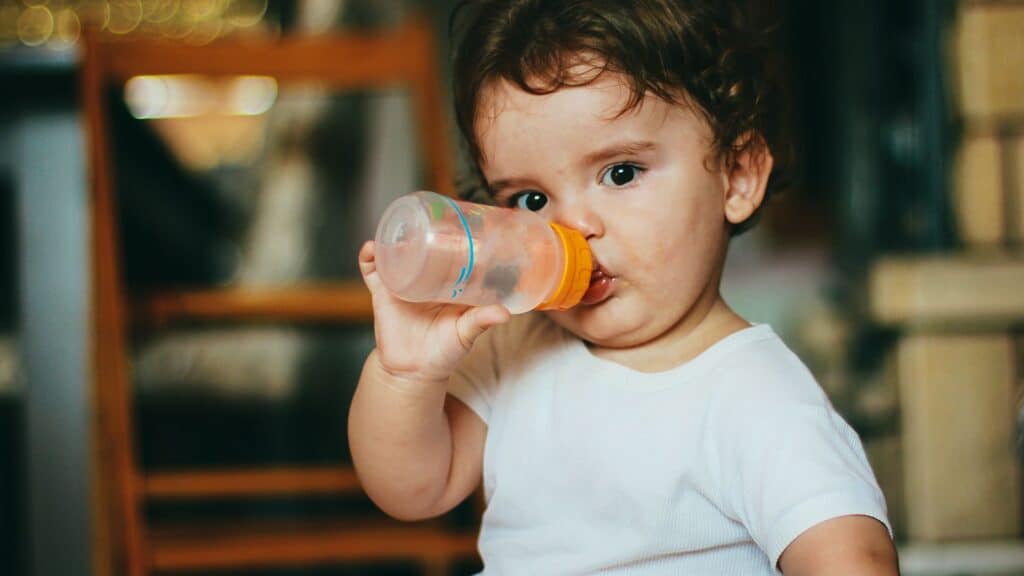
When Can Babies Have Water and How to Offer It
According to the American Academy of Pediatrics, waiting until your baby reaches 6 months old is recommended before introducing any liquid other than breast milk or infant formula.
Even if your baby is over 6 months but hasn’t started eating solid food, it is still best to only offer breast milk or formula, as young babies have delicate stomachs that are not as good at digesting liquids as adults.
Signs That a Baby May Be Ready for Water
While breast milk is the best first choice for your baby’s nutrition, there are some signs that you may be ready to introduce water into your baby’s diet.
Signs that a baby may be ready for water include:
- They are six months old or older
- They have reached their full weight at birth (usually around 8 pounds)
- They have doubled their birth weight (which usually happens by 4 months)
Risks of Giving Water Too Early
Giving babies water too early can cause water intoxication, leading to diarrhea and dehydration. It’s essential to wait until your baby is ready before giving them any liquids other than breast milk or formula, as they need all the nutrients in breast milk and formula. If you give your baby water before they are ready, you’ll need to keep an eye on their stools to ensure they’re not dehydrated.
It’s also important to note that while breastfed babies can have breast milk as soon as they are born, formula-fed babies may need to wait until their digestive system has developed enough to handle it. When introducing other drinks, such as undiluted fruit juice, it’s best to wait until your baby is around 6 months of age and has started eating solid foods.
When you’re ready to introduce water, it’s best to use a straw cup or an open cup instead of a sippy cup. Sippy cups can promote prolonged water consumption, leading to less breast milk intake, particularly in younger babies. You should also avoid using tap water or fruit juice in the beginning.

How Much Water Should a Baby Drink?
Babies can drink water at any time of the day, but it’s important to remember that babies should not be allowed too much water. This is because water can lead to dehydration and also upset the stomach.
The recommended daily water intake for babies is 2 to 3 cups of water. It’s important to note that this is the minimum amount of water you should give your child.
Most babies will need more than this, especially if you live in an area with high temperatures and humidity. The American Academy of Pediatrics (AAP) recommends giving your baby a bottle of water instead of juice or other beverages whenever possible.
If you notice that your baby has a dry mouth when they wake up from a nap or if their diaper feels dry, it is important to increase their intake of fluids.
In these cases, you may want to give them an extra ounce of breast milk or formula before bedtime to be well-hydrated when they return to sleep.
Factors That Affect a Baby’s Water Needs
The amount of water a baby needs to drink depends on a number of factors, including:
Age:
Your baby’s age is a huge factor in determining how much water they need to drink. Babies under one year old require more water than older children, as their brains are still developing and growing.
Weight:
As your baby grows, it will need more fluids to stay hydrated. The amount of water a baby needs per pound of body weight varies by age.
The average newborn needs 13 ounces of fluid daily. By 3 months, the amount increases to 24 ounces per day; by 6 months, it is 32 ounces per day; and by 12 months, it is 48 ounces per day.
Climate:
Your climate will impact the amount of water your baby needs. Babies in hot climates need more water because they lose more fluid through sweat. Babies in cold temperatures need less water because they lose less fluid through sweat.
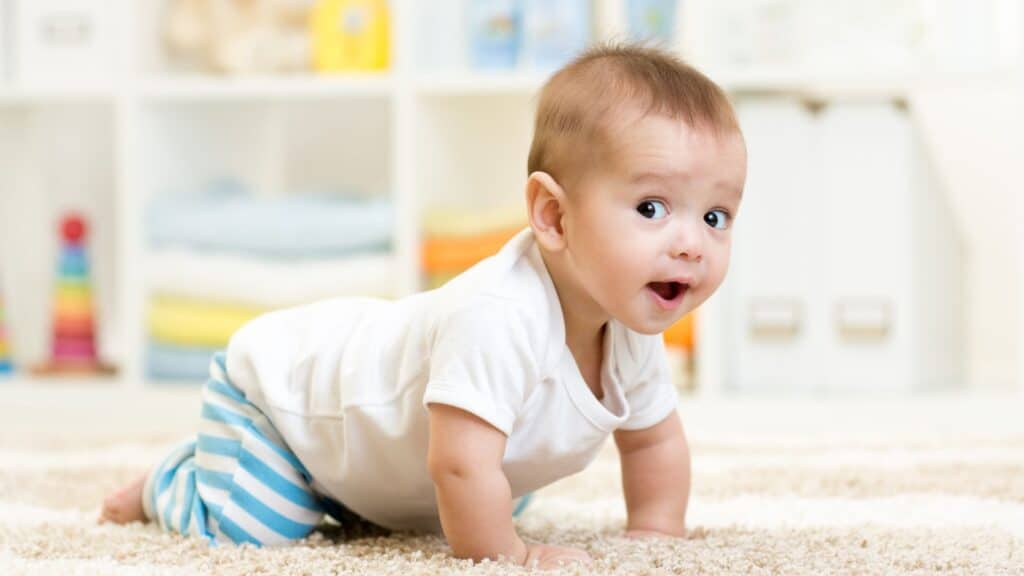
Activity Level:
Your baby’s activity level is another important factor in determining their needed water. If your child is running around, playing, and doing everything babies do, they need more water than sleeping or resting.
Active babies will benefit from drinking more water, and those who are less active may need a little less as their activity level decreases.
Illness:
Illness is a major factor that affects a baby’s water needs. A sick baby needs to drink more water than a healthy baby. This is because their immune systems are better able to fight off illness when they are hydrated, and they are also losing fluids through vomiting and diarrhea.
Breastfeeding or Formula Feeding:
Breast milk and formula provide all the necessary fluids for babies younger than six months old. If a baby is not breastfeeding or formula feeding, they may need additional fluids.
Introduction of Solid Foods:
When solid foods are introduced, babies may need additional fluids to help wash down the food and stay hydrated.
It’s important to note that water should not replace breast milk or formula as the primary source of nutrition for babies younger than six months old.
Also, babies should not be given water but milk during their first year. Always consult with your pediatrician before making any changes to your baby’s diet or fluid intake.
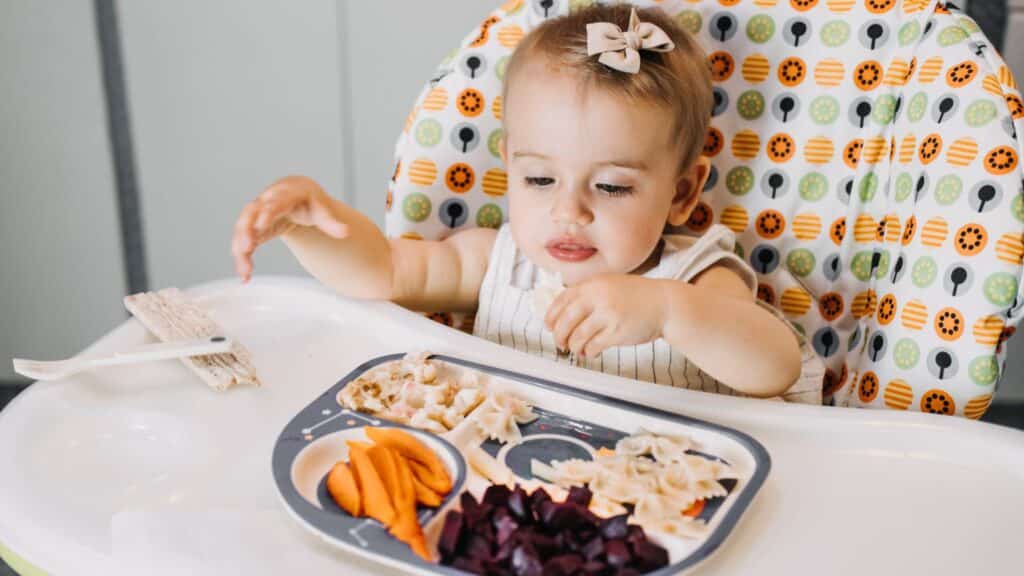
Signs of Dehydration in Babies
Dehydration is a severe condition that can cause seizures and even brain damage. It can happen to anyone, even babies! When you think your baby might be dehydrated, check these signs:
- Dry mouth or cracked lips.
- Dark circles under the eyes.
- No tears when crying.
How to Give Water Safely to Babies
Giving water to babies can be tricky, as it is essential to ensure that the water is safe and that the baby is getting the right amount. Here are some tips to give water safely to babies:
- Wait until the baby is six months old: Breast milk or formula provides all the hydration needed until they are six months old. So, there is no need to give water before that age.
- Use clean and safe water: Make sure that the water you give your baby is safe and clean. You can use boiled and cooled or bottled water labeled as safe for infants.
- Give small amounts: Start with a few sips of water and gradually increase the amount as the baby grows. Too much water can fill the baby’s tummy, making them less interested in feeding.
- Use a cup or a bottle: You can use a cup or a bottle to give water to your baby. Avoid using a bottle with a nipple, as this can cause nipple confusion and interfere with breastfeeding.
- Don’t add anything to the water: Do not add any sugar, honey, or other substances to the water, as these can be harmful to your baby.
- Watch for signs of dehydration: Keep an eye out for signs of dehydration, such as dry mouth, sunken eyes, fewer wet diapers, and listlessness. If you notice these signs, contact your baby’s healthcare provider.
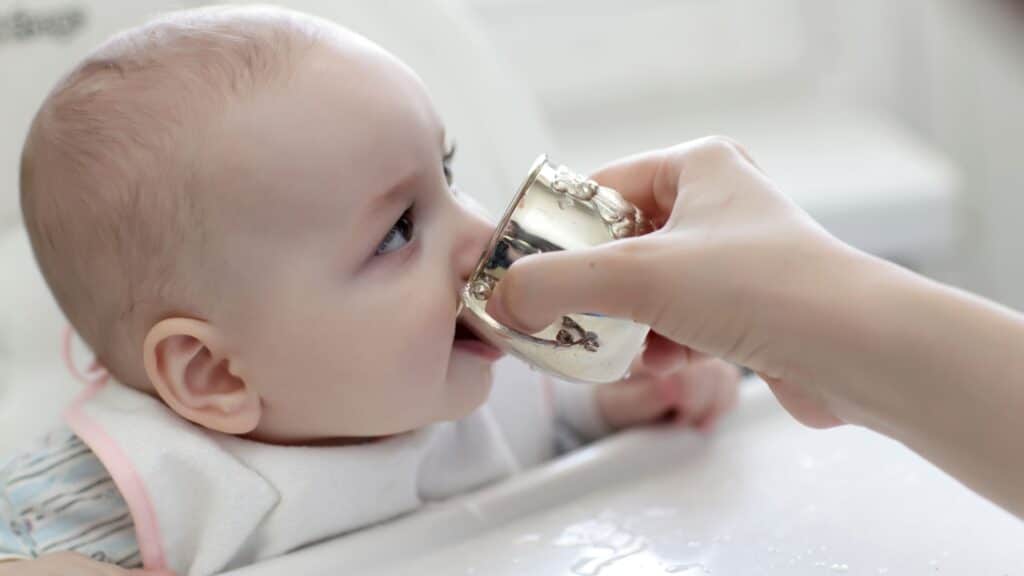
Other Tips for Keeping Your Baby Hydrated
Keeping your baby hydrated is essential for their overall health and well-being. Here are some additional tips to help ensure your baby stays hydrated:
Breastfeeding or formula feeding:
Breast milk or formula is the primary source of hydration for infants up to six months of age. Breastfeed or offer formula regularly to meet your baby’s hydration needs.
Introducing solid foods:
As your baby grows and starts to eat solid foods, you can offer them foods that are high in water content. Examples include pureed fruits and vegetables like watermelon, cucumber, and peaches.
Offering water-rich fruits and vegetables:
As your baby ages and eats solid foods, offer them water-rich fruits and vegetables, such as watermelon, cucumber, oranges, and strawberries. These foods not only provide hydration but also offer essential vitamins and minerals.
Avoiding sugary drinks:
Avoid giving your baby sugary drinks, such as juice or soda, which is essential. These drinks can lead to tooth decay and contribute to obesity. Stick to water or breast milk/formula as your baby’s primary source of hydration.
Encouraging frequent feeding:
Encourage your baby to feed frequently, which will help ensure they get enough fluids. Watch for signs of hunger and offer breast milk or formula as needed.
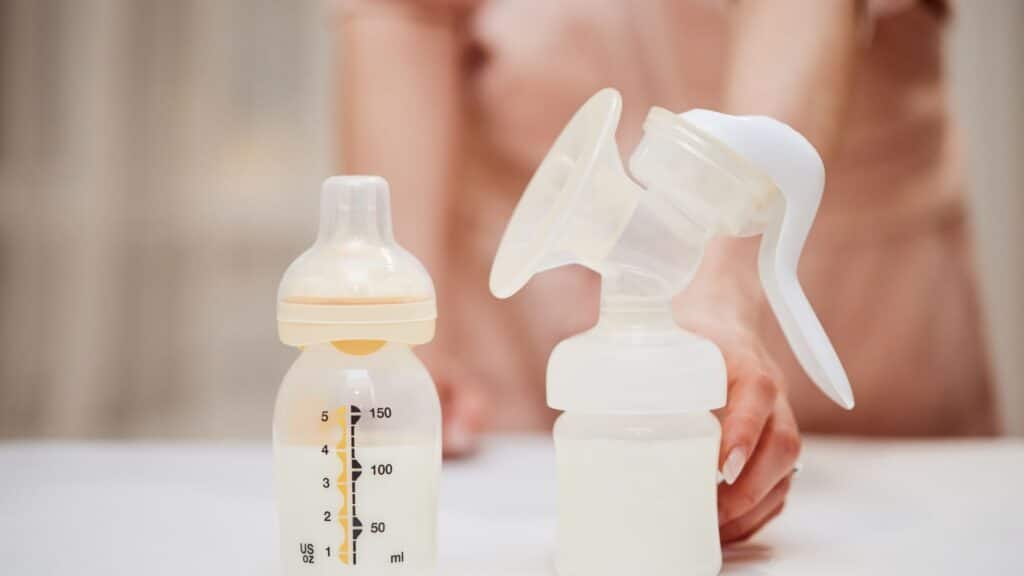
Monitoring urine output:
Keep an eye on your baby’s diaper output. They should have several wet diapers daily, indicating they are getting enough fluids.
Recognizing and Managing Water Intoxication in Babies
While it’s essential to introduce water to your baby at the right time, it’s also important to be aware of the risks of water intoxication and how to manage it. Water intoxication occurs when a baby consumes an excessive amount of water within a short period, leading to electrolyte imbalances and potentially life-threatening complications. This section will discuss the signs of water intoxication, how to prevent it, and what to do if you suspect your baby is experiencing it.
Signs of Water Intoxication in Babies
Some common signs of water intoxication in babies include:
- Swollen face and limbs
- Lethargy or increased sleepiness
- Inconsolable crying or irritability
- Low body temperature
- Seizures or spasms
If you notice any of these symptoms in your baby, it is crucial to seek immediate medical attention.
Preventing Water Intoxication
To prevent water intoxication, it’s essential to follow these guidelines:
- Wait until your baby is at least six months old before introducing water into their diet.
- Limit the amount of water your baby drinks. Give only small sips initially and gradually increase the amount as they grow older.
- Always use a cup or a bottle to give water to your baby. Avoid using a bottle with a nipple, as it can lead to overconsumption.
- Encourage your baby to drink water at regular intervals instead of large amounts in one sitting.
Managing Water Intoxication
If you suspect your baby is experiencing water intoxication, it is vital to seek medical help immediately. In the meantime, you can take the following steps to help your baby:
- Stop giving water to your baby immediately.
- Keep your baby warm and comfortable. As low body temperature is a common symptom of water intoxication, you may need to wrap your baby in a blanket or adjust the room temperature.
- Give your baby breast milk or formula, as these fluids will provide essential electrolytes to help balance the levels in their body.
- Monitor your baby closely for any changes in his or her condition.
In conclusion, being aware of the risks of water intoxication and taking the necessary precautions to prevent it is essential in keeping your baby safe and healthy. Properly managing your baby’s water intake while being vigilant about potential signs of water intoxication can contribute to their overall well-being and prevent potentially dangerous complications. Remember always to consult with your pediatrician if you have any concerns or questions about your baby’s hydration and water intake.
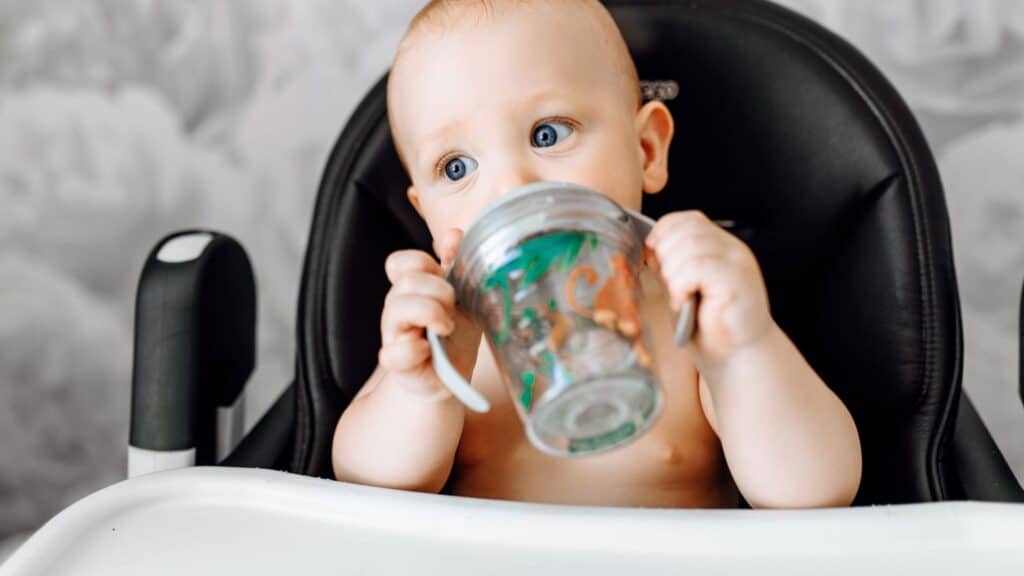
Takeaways
When introducing your baby to water, it’s important to wait until they are at least 6 months old before giving them any liquid other than breast milk or formula.
Giving water too early can lead to stomach cramps, diarrhea, and pneumonia. Signs that your baby may be ready for water include:
- Reaching their full weight at birth.
- Doubling their birth weight (usually by 4 months).
- Being 6 months old or older.
However, it’s important to remember that breast milk or formula should still be the primary source of nutrition for babies under 6 months old, and water should not replace them.
When introducing water, it’s crucial to keep track of your baby’s water intake and ensure they are not given too much, as it can lead to dehydration and upset stomach.
Please feel free to ask any questions you may have in the comments below.

